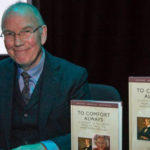
I have had close links with Hospice UK for many years, serving first as a Trustee and now as a Vice-President. So it was a real honour to be invited to give the opening plenary at the charity’s annual conference in Liverpool, in a splendid riverside setting overlooking the Mersey. The timing was good too. With my book To Comfort Always on the history of palliative medicine just out, there was a great opportunity to look into the past, and also to speculate a bit on the present and future.
Seven ages …
Departing from the structure of the book, I decided to divide the almost 200 years I wished to cover, into ‘seven ages’. I explained that these were not absolutely separate time periods but could be used to identify dominant themes and tendencies in the history of hospice and palliative care more widely. I described them as ‘an antidote to thinking only in the moment’. Being keen on Twitter, I also defined each ‘age’ in 140 characters. This was the result:
Awakening. Medical men describe procedures for managing the terminally ill, fear of dying process increases & meaning of euthanasia changes
Charism. Nursing women deliver religiously motivated institutional hospice care but wider influence is weak and growth is limited
Indifference. Dying becoming taboo, medicine retreats from the deathbed, knowledge is lost, social conditions change, suffering increases
Uncertainty. Practitioners look for knowledge, concerned that care of the dying is de-valued, while calls for legalised euthanasia increase
Formation. ‘Total Pain’ transforms care of the dying to multi-disciplinary endeavour using teamwork, knowledge base & teachable skills
Recognition. Hospice-palliative care is field of specialisation with associated research & education: definitional & boundary debates begin
Challenge. Global need rises. Policies, services & new models seek to bridge gap using public health, evidence base & quality improvement
There were some keen Tweeters in the audience and so the ‘seven ages’ were soon circulating on the social media, as I learned subsequently. Someone kindly put up a ‘periscope’ and started streaming the talk live, which was nice of them
Haiku …
I was astonished afterwards however to learn that there was also a ‘Haiku’ theme going on at the conference – capturing the discussions in even fewer characters – and certainly in more poetic ways. These too were shared on social media and I am grateful to their author, Paul Isherwood – the Bolton Hospice Poet – for permission to reproduce them here.
To Comfort Always
Nineteenth century care
Easeful death, assuaging fear
Accepting of fate.
Medicine is an art
An involvement of the heart
In uncertain life.
Indifference, taboo
‘Dying’ as a failure
Neglect by hubris.
‘All of me is wrong’
Clinical scene as nature
Brings a healing plan.
Uncertainty sees
The need for Peace at the Last
Someone to be with.
Recognising death,
Improving the quality
Of how we let go.
Death as Public Health
Specialty recognition
Now we need to talk.
Dying is an Art
Poets and medics agree?
Let’s create a way.
The lecture …
It was wonderful to get such interest. The comments and feedback afterwards were really encouraging. I have never known so many tweets on any aspect of my work before. You can catch up on them via Twitter HUKconf16
To add to the general ‘buzz’ around the whole event, Emma Hodges, Group Chief Executive of St Giles’ Hospice, wrote a thoughtful review of the book on ehospice
I have also had several invitations to speak elsewhere on aspects of hospice and palliative care history.
So my thanks go to everyone who has been so encouraging and to the Hospice UK organisers for inviting me. I hope lots of people will enjoy the book – I saw a Dutch tweeter saying it was one for the Santa Claus list!
Meanwhile, here is my lecture in full if you would like to watch it.
David Clark
- 16 November 2016 Haikus inspired by David Clark Phil Isherwood (Bolton Hospice Poet)
- Book signing image courtesy of Jonathan Goldberg
- You can view the other plenaries from the HospiceUK 2016 conference here:

